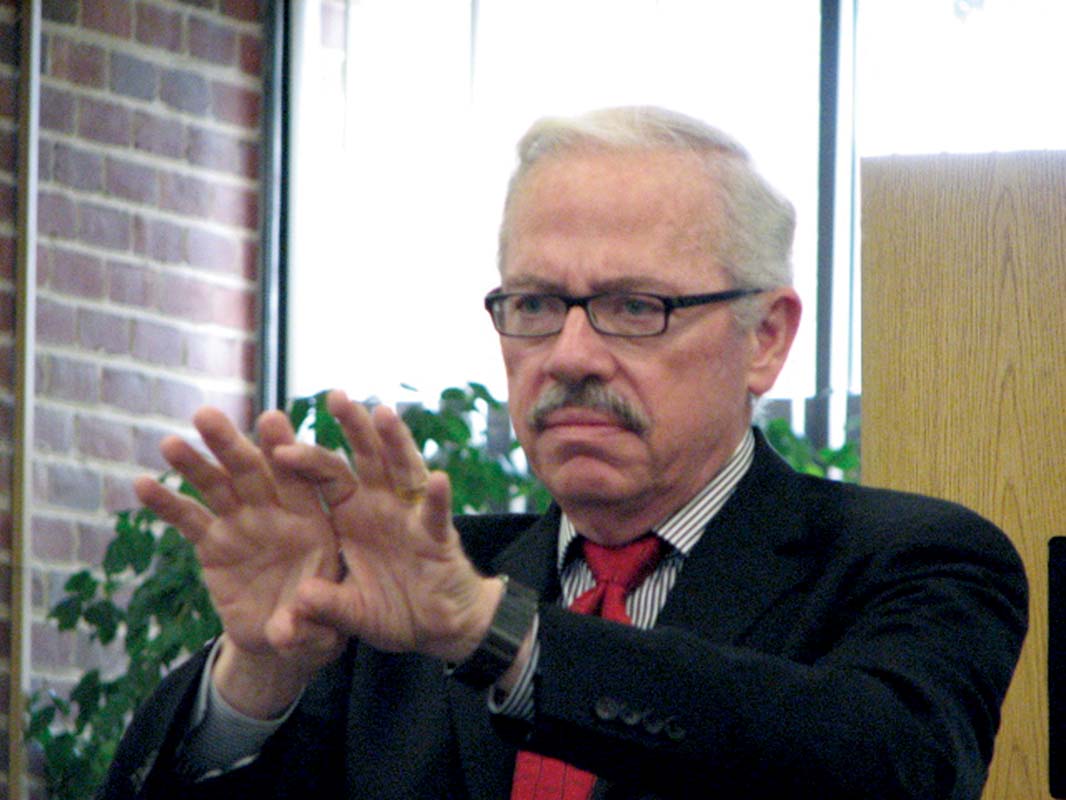Bob Barr on Changing The Status Quo
 Story by Broadside Interim Assistant News Editor Sonya Hudson. Photo by Elizabeth Biondi.
Story by Broadside Interim Assistant News Editor Sonya Hudson. Photo by Elizabeth Biondi.
Bob Barr, the Libertarian Party presidential candidate for 2008, spoke to an intimate group of about 40 Mason students in Patriot’s Lounge in Student Union Building I in the early, rainy evening of Friday, Sept. 12.
Barr discussed his grievances with the two-party system in America, in which the Democrat and Republican Parties dominate every election. Third parties are not usually highly regarded and do not have the luxury of automatic ballot access.
One of the Libertarian Party’s main goals this year is to get enough votes to allow the party to reserve a spot on the presidential ballot, automatically.
Barr briefly educated students on the history of the Libertarian Party and its main message.
“The Libertarian Party is the nation’s oldest third party, born in 1971,” Barr said. “It’s the nation’s largest third party with 300,000 members. The Libertarian Party is the only one of the third parties that has had consistent ballot access.”
“The Libertarian Party is trying to get our message of maximized individual liberty and minimized government power to the American people,” Barr said.
As with most politicians, Barr slammed his opponents, the two major parties and their rhetoric of change and claimed that both parties are representative of the status quo.
Though Barr degraded the two-party system, he used to be a key player in it. For eight years, from 1995 to 2003, Barr served in Congress as a Republican. As a disgruntled Republican, Barr then switched to the Libertarian Party.
Barr acknowledged Americans dissatisfaction with the current administration and their interest in change for Washington, denounced the other two parties’ ability to bring that change and promoted his own abilities.
Barr said that the Democrat and Republican Parties are not parties of change, as their platforms say, but they are the status quo.
“Both of the parties are nothing if not status quo,” Barr said. “They have created this animal that is Washington, and a political system that does everything that it can to keep off the playing field everybody but those two parties, and then they wonder, for example, why the public is so dissatisfied with that system that they have created and that they perpetuate.”
“They leave themselves in complete control as to who is going to get access to the debates,” Barr said, speaking of the Democrat and Republican Parties.
Barr’s message, essentially, is to give Americans more choices than just the two-party system. Barr says that Americans deserve to have another choice rather than just choosing between “the lesser of two evils.”
“If you don’t have that open system, then I think we will see a continuation and a deterioration of the level of public policy in debate and the quality of public policy in this country and that means continuing to infringe on our liberties and a complete lack of any real change,” Barr said.
Barr’s policies include diminishing the strength of the federal government and giving more power to the individual states. Barr would like to abolish the Department of Education and leave education to the states. Barr is against abortion, but would leave the final laws up to the states. The right to bear arms would be protected under Barr, as it is explicitly stated in the Second Amendment of the Constitution.
Barr thinks the Libertarian Party’s key supporters are disenchanted Republicans, blue collar Democrats, especially those who support the Second Amendment, and young voters who are interested in issues concerning social security.
Barr concluded by asking for support and contributions from Mason students.
After Barr spoke, several Mason students expressed their disappointment in Barr’s speech and question and answer section.
“His speech did not fully captivate the party’s direction, which was unfortunate,” said Libertarian Carly Reddig, a freshman economics major who has no faith in the two-party system.
Members of the two major parties where not so thrilled to hear Barr’s rhetoric either.
“I don’t see what’s so exciting; he’s just another Republican in the race. He’s not a Libertarian, even Libertarians know that. A vote for Bob Barr is a vote for Barack Obama,” said Joshua St. Louis, a sophomore government and international politics major and the Second Vice Chairman of the College Republicans.
Students who wanted to learn more about the Libertarian Party left with unanswered questions.
“I thought he should have answered more questions at the end. I felt like he could have answered five or six more questions. There were a lot of people with their hands up and people came here because they want to know more about Libertarians,” said Eron Ackerman, a second year graduate student working on his M.A. in history.
Students left confused about the Libertarian Party and Barr’s own party relations. Barr did not conjure up much support from Mason students, as many left with their votes and beliefs un-shifted and their need for change, just not Barr’s change, intact.
